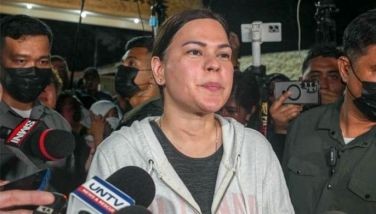UN boosts RP contraceptive use
April 16, 2005 | 12:00am
How much will it cost to slow down the country’s birth rate?
Officials said yesterday that weaning the Philippines from dependence on US contraceptive donations will cost P56 million, which the United Nations Population Fund (UNFPA) will provide to assist the Department of Health (DOH) and the Philippine Health Insurance Corp. (PhilHealth).
The United Nations subsidy to the Philippines will help the country make the transition from dependence on contraceptive donations from the United States Agency for International Development (USAID) following announcements the donations will end in three years.
The USAID contraceptive donations have been ongoing for 30 years, until the agency decided that the Philippines needs to stand on its own in providing the public with birth control methods. It gradually reduced its support and the last shipment of birth control pills will arrive in 2007.
Under the UNFPA program, a local non-government organization, DKT Philippines, will set up outlets in different parts of the country to distribute contraceptives at subsidized prices.
The UNFPA’s 6th Country Program of Assistance project aims to soften the impact of USAID’s withdrawal of contraceptive donations to the Philippines, Health Secretary Manuel Dayrit said.
Dayrit said that with the phaseout of free, donated contraceptives, more local manufacturers will be encouraged to enter the market to provide birth control devices, reducing commercial prices on such products.
He said the local contraceptive manufacturing industry "is still fledgling because many of the contraceptives are free and, if you’re going to provide it for free, no one wants to do business."
DKT program manager Edwin Alejo said that besides selling subsidized contraceptives including condoms, pills and injectable devices, their outlets will also educate the public on family planning and reproductive health.
DKT will sell a box of three condoms for P10, about half the commercial price. DKT is the distributor of the Trust and Frenzy brands of condoms.
Under the supervision of the DOH and PhilHealth, DKT will provide contraceptives to districts in the poorest areas of the northern and southern Philippines, UNFPA representative Florence Tayzon said.
DKT country director Terry Scoot said DKT will carry out a franchise operation designed to strengthen the capacities and capabilities of local government units and non-government organizations (NGOs) to procure and deliver contraceptives to target populations in the provinces of Ifugao, Mountain Province, Masbate, Eastern Samar, Bohol, Maguindanao, Lanao del Sur, Sulu, Tawi-Tawi and Sultan Kudarat and Olongapo City in Zambales from 2005 to 2009.
"We’re in transition," Dayrit said. "After five years, if the market becomes more mature and you have more competitors coming in and technology is improved, then you will have more products on the market and they will not cost as much."
Although the government is opening up the contraceptives market, it will not "coerce" the public to use them, Dayrit stressed.
"I think, after five years, what will happen is that you still have a segment that will be very poor and, probably, they will be getting free contraceptives from the government," he said, "then you’ll have segments of the population that will be buying them from the commercial sector, whether this commercial sector is subsidized or not, and then you’ll have a segment of the population that will not be using contraceptives at all because they are using natural methods."
He said "we need to look for other mechanisms" to make birth control more widely available.
Local politicians have been reluctant to allocate funds for artificial contraceptives for fear of angering the dominant Roman Catholic church, which opposes the use of such devices.
The church counts more than 80 percent of the population as followers. It has campaigned against government efforts to encourage contraception and has attacked politicians who support such programs.
"It’s controversial but we’re moving forward," he said.
President Arroyo, a devout Catholic, has been reluctant to promote artificial birth control methods.
Some local governments, including the authorities in the capital city of Manila, have blocked the distribution of contraceptives by local health units.
A survey by the Social Weather Stations research group last year revealed that only 30 percent of adult Filipinos use any form of birth control. — With AFP
Officials said yesterday that weaning the Philippines from dependence on US contraceptive donations will cost P56 million, which the United Nations Population Fund (UNFPA) will provide to assist the Department of Health (DOH) and the Philippine Health Insurance Corp. (PhilHealth).
The United Nations subsidy to the Philippines will help the country make the transition from dependence on contraceptive donations from the United States Agency for International Development (USAID) following announcements the donations will end in three years.
The USAID contraceptive donations have been ongoing for 30 years, until the agency decided that the Philippines needs to stand on its own in providing the public with birth control methods. It gradually reduced its support and the last shipment of birth control pills will arrive in 2007.
Under the UNFPA program, a local non-government organization, DKT Philippines, will set up outlets in different parts of the country to distribute contraceptives at subsidized prices.
The UNFPA’s 6th Country Program of Assistance project aims to soften the impact of USAID’s withdrawal of contraceptive donations to the Philippines, Health Secretary Manuel Dayrit said.
Dayrit said that with the phaseout of free, donated contraceptives, more local manufacturers will be encouraged to enter the market to provide birth control devices, reducing commercial prices on such products.
He said the local contraceptive manufacturing industry "is still fledgling because many of the contraceptives are free and, if you’re going to provide it for free, no one wants to do business."
DKT program manager Edwin Alejo said that besides selling subsidized contraceptives including condoms, pills and injectable devices, their outlets will also educate the public on family planning and reproductive health.
DKT will sell a box of three condoms for P10, about half the commercial price. DKT is the distributor of the Trust and Frenzy brands of condoms.
Under the supervision of the DOH and PhilHealth, DKT will provide contraceptives to districts in the poorest areas of the northern and southern Philippines, UNFPA representative Florence Tayzon said.
DKT country director Terry Scoot said DKT will carry out a franchise operation designed to strengthen the capacities and capabilities of local government units and non-government organizations (NGOs) to procure and deliver contraceptives to target populations in the provinces of Ifugao, Mountain Province, Masbate, Eastern Samar, Bohol, Maguindanao, Lanao del Sur, Sulu, Tawi-Tawi and Sultan Kudarat and Olongapo City in Zambales from 2005 to 2009.
"We’re in transition," Dayrit said. "After five years, if the market becomes more mature and you have more competitors coming in and technology is improved, then you will have more products on the market and they will not cost as much."
Although the government is opening up the contraceptives market, it will not "coerce" the public to use them, Dayrit stressed.
"I think, after five years, what will happen is that you still have a segment that will be very poor and, probably, they will be getting free contraceptives from the government," he said, "then you’ll have segments of the population that will be buying them from the commercial sector, whether this commercial sector is subsidized or not, and then you’ll have a segment of the population that will not be using contraceptives at all because they are using natural methods."
He said "we need to look for other mechanisms" to make birth control more widely available.
Local politicians have been reluctant to allocate funds for artificial contraceptives for fear of angering the dominant Roman Catholic church, which opposes the use of such devices.
The church counts more than 80 percent of the population as followers. It has campaigned against government efforts to encourage contraception and has attacked politicians who support such programs.
"It’s controversial but we’re moving forward," he said.
President Arroyo, a devout Catholic, has been reluctant to promote artificial birth control methods.
Some local governments, including the authorities in the capital city of Manila, have blocked the distribution of contraceptives by local health units.
A survey by the Social Weather Stations research group last year revealed that only 30 percent of adult Filipinos use any form of birth control. — With AFP
BrandSpace Articles
<
>
- Latest
- Trending
Trending
Latest
Trending
Latest
Recommended

































